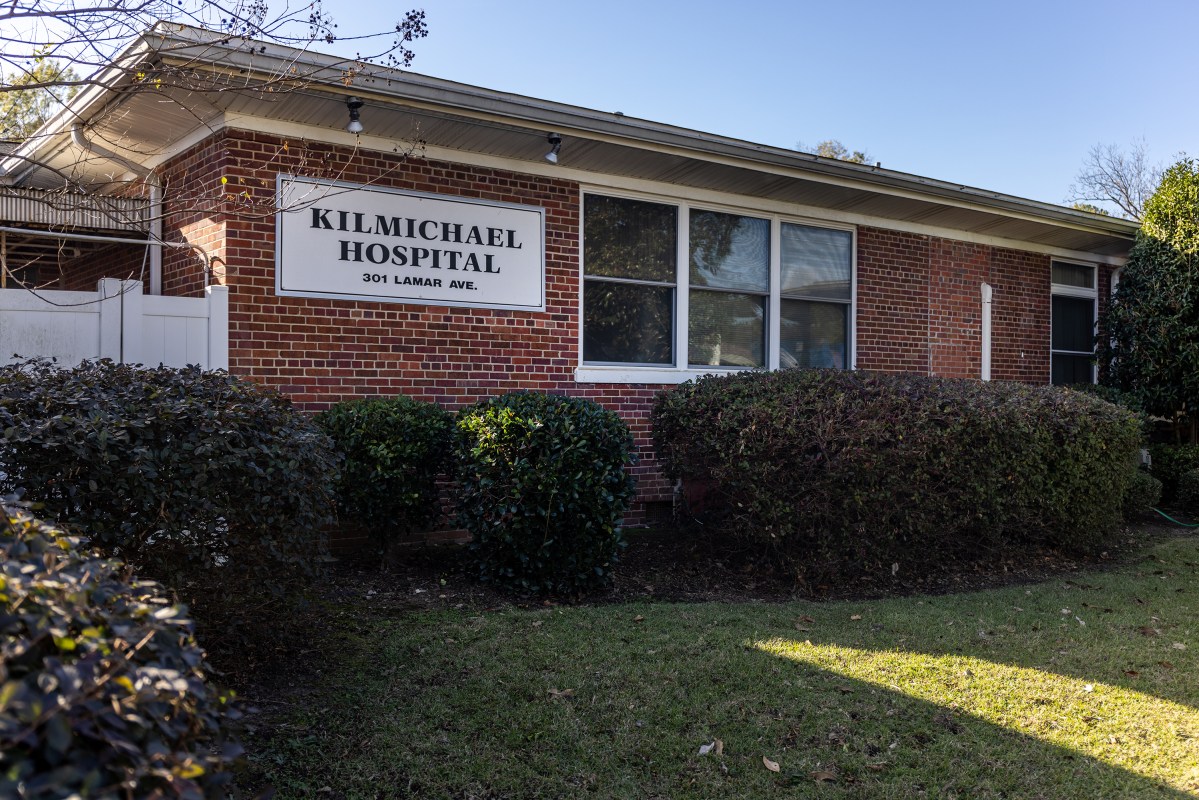Mississippi Today
‘What’s your plan, watch Rome burn?’: Politicians continue to reject solution to growing hospital crisis
‘What’s your plan, watch Rome burn?’: Politicians continue to reject solution to growing hospital crisis
Note: This article is part of Mississippi Today’s ongoing Mississippi Health Care Crisis project.Read more about the project by clicking here.
Mississippi's only burn center has closed. The Delta's only neonatal intensive care unit has closed. A Jackson hospital that serves vulnerable populations is gutting key services to balance its budget. One of the state's largest hospitals is months, if not weeks, from shutting its doors for good.
Mississippi hospitals are in crisis, struggling to keep up with rising industry costs and cover care for the sixth-most uninsured population in America. Six hospitals have closed across the state since 2005, and countless more have reduced services and staff.
Even more sobering, the state's top health care leaders warn that a dozen more hospitals across the state are in imminent danger of closing.
“Things are getting worse, not better,” Dr. Dan Edney, the state’s health officer, said in an October Board of Health meeting. “We know of 10-12 hospitals statewide that may not even be here one year from now … Those of us who are watching this in health care leadership statewide have a lot of concern.”
As the Mississippi health care crisis worsens, the state's political leaders are facing growing pressure from health care professionals to do something they've refused for 12 years: expand Medicaid. Doing so, as 38 states have done, would provide immediate financial relief to the state's hospitals that are struggling to stay alive, countless economic and health care experts have said.
About 12% of Mississippians are uninsured, leaving hospitals with little to no way to recoup the costs of care administered to some of the nation’s poorest and unhealthiest patients. Hospitals are required to provide life-saving care to everyone, regardless of whether they’re insured. In many cases, those costs are bringing hospitals — including Greenwood Leflore Hospital in the Mississippi Delta — to the brink of closing.
Studies, including one from the state economist, have shown Medicaid expansion would provide health care coverage for at least 200,000 primarily working Mississippians who don’t currently have it. More than $1 billion per year would flow to the state after expansion, and hospitals would directly receive hundreds of millions to cover rising costs. The study also showed Medicaid expansion would create more than 11,000 jobs per year from 2022 to 2027.
READ MORE: Mississippi leaving more than $1 billion per year on table by rejecting Medicaid expansion
"When you have major hospital systems in this state that have lost a quarter billion dollars last year, hospitals that have never had losses having them now and others budgeting for major losses for next year — the number of hospitals close to the brink is the most it's ever been,” said Tim Moore, president of the Mississippi Hospital Association, an organization that has for years lobbied for Medicaid expansion.
But Gov. Tate Reeves, Speaker of the House Philip Gunn and several powerful political brokers in Jackson have stood firm against even the suggestion of expansion, ignoring the dozens of economic experts who say the state can afford it and that hospitals would be much better off.
“No, I don't support expanding Medicaid in Mississippi,” Reeves told a Mississippi Today reporter last week during a hospital event in Ocean Springs. “I made, very clear, my position when I was running for governor in 2019. What we've got to do in Mississippi is we've got to continue to focus on economic development, job creation, bringing better and higher paying jobs to our state.”
The health care landscape in Mississippi — and nationwide — has changed dramatically since Reeves first made that campaign promise. The stresses of the pandemic widened the cracks in already struggling hospital systems. Labor and supplies costs have surged, making even traditionally profitable hospitals reassess their budgets and services.
Reeves recently pushed legislation giving $246 million in state-funded incentives to a steel mill promising 1,000 new jobs in 10 years. It is private sector jobs, Reeves said, that will most benefit the state’s health care.
“People who work in the private sector that have private insurance have typically far better coverage,” he said.
But the state’s leaders have repeated that refrain for many years, and little has budged with either job creation or health care outcomes. Meanwhile, hospitals across the state are scrambling to make up for lost revenue.
READ MORE: Who’s opposed to Mississippi Medicaid expansion and why?
One of the state’s largest hospitals, North Mississippi Medical Center in Tupelo, is having to manage higher operating costs while caring for uninsured patients. State Sen. Chad McMahan, a Republican who represents the hospital and surrounding area, stops short of advocating for Medicaid expansion. But unlike many of his GOP colleagues in the Legislature, he wants to debate its merits.
The main reason he’s publicly bucked his party leaders, McMahan says: His local hospital would benefit.
“I’ll tell you how large the hospital is,” McMahan told Mississippi Today. “The hospital is so large that if it were to close, we’d have to have seven Toyota-sized manufacturing plants to replace the economic value and salaries (of the hospital), which means it would never happen in our lifetime. Values of homes would drop 15% overnight. You better believe I’m for health care. I’m for health care because it's the right thing to do for Mississippians … It’ll sustain our communities, cities and counties.”
Gulfport Memorial Hospital, another major institution whose CEO is a major political donor to Reeves, reported operating costs going up nearly 18% in 2021. They hit operating losses just shy of $67 million for the last fiscal year.
To Gulfport’s east, the Singing River Health System’s CEO is searching for a larger system to buy its publicly-owned Gulf Coast hospitals. The system is not in dire financial straits, but leadership says they’re trying to be proactive before they hit a crisis point.
In his recent announcement of the tax incentives for the steel mill, Reeves did not mention the 600-plus current jobs that are in jeopardy at Greenwood Leflore Hospital. But the major hospital in the Delta could close imminently, leaders warn. They hoped to strike a deal with the state’s only academic hospital – Jackson’s University of Mississippi Medical Center – but those plans dissolved at the beginning of the month.
Greenwood Leflore leaders are trying to stretch their budget to stay open over the next two months with hopes the Mississippi Legislature will step in to save it. Greenwood Leflore interim CEO Gary Marchand has publicly advocated for Medicaid expansion, saying it would go a long way in helping balance the hospital’s budget.
“What’s your plan: To watch Rome burn and to let hospitals close?” said Dr. Gary Wiltz, a Medicaid advocate and the CEO of a system of 19 of rural health clinics in Louisiana. “It goes back to a fundamental question: is health care a right or a privilege?”
Q&A: What is Medicaid expansion, really?
Pioneer Community Hospital of Newton on Thursday, Nov. 10, 2022. The hospital closed in December 2015.
Merit Health Central, a private hospital in Jackson, has moved or is planning to move its cardiovascular services, neonatal intensive care unit and endoscopy to other locations outside of the city. It already closed its burn center – the only in the state to provide specialized care.
Merit Health Central, formerly Hinds General Hospital, has long been a health care and employment hub in south and west Jackson. Merit Health pointed to “the state’s decision to not expand Medicaid” in addition to labor costs and staffing challenges as to why it is scaling back its operations in a statement to Mississippi Today.
Even Mississippi hospitals that may not be in imminent danger of closing are still facing uncovered costs that are beginning to bleed their budgets dry. Masks, surgical supplies, even food and human resource services have all shot up cost – and that’s on top of the charity treatment hospitals incur costs of for patients too poor to pay for care.
Stan Bulger, who serves on the board of directors at Magee General Hospital, said expanding Medicaid would help to offset revenue losses his hospital incurs for uncompensated care.
"We're losing out on about 15% of the revenue we could collect every month," Bulger said. "We're constantly trying to find ways to make that work, but if you think about it, no business can operate long-term with that much loss. Expanding Medicaid would significantly help us cover that hole, and it could legitimately keep us alive."
UMMC, the state’s only academic hospital, had a $7 million loss in its first fiscal quarter – a loss they predicted as they battled rising nursing costs. The hospital system spent $22 million on staffing temporary nurses to fill gaps. These nurses make about two-and-half times the salaries of those nurses actually employed by the hospital.
Singing River has about 200 positions open. That’s staffing they, too, have to fill with pricier contracted labor. Singing River CEO Tiffany Murdock said she supports Medicaid expansion – and that she agrees any revenue would help hospitals fill gaps.
“If they’re just coming into our hospital with those acute care problems, they are a high dollar,” said Murdock. “With (Medicaid expansion) we’d get reimbursement for that expense that right now…we’re not.”
Increased health care coverage would also likely lead to better patient outcomes. Typically patients without health care go without a primary care doctor, their health problems getting worse – and more expensive – than if they had access to intervening medical care.

Wiltz, the Louisiana doctor and CEO of Teche Action Clinic, saw how health care in Louisiana transformed under Medicaid expansion: diabetes patients who risked limb loss with their disease now under control and people with cancerous polyps removed during colonoscopies they would have likely never had without coverage.
As of October of this year, 750,340 people in Louisiana have enrolled in Medicaid expansion. Since 2017, the state health department reported that 84,651 people received colonoscopies that likely wouldn’t have before expansion. Of that, close to 26,000 got polyps removed that could help prevent colon cancer. Another 131,680 got breast cancer screenings.
Wiltz has an easier time balancing his system’s books to secure their future serving rural residents because of the reliable reimbursements form his patients.
“Thank God Louisiana and our governor had enough integrity and compassion to expand Medicaid,” he said. “I really hope that other states – particularly Mississippi – that sees a similar population as we do would come to that same conclusion.”
But in Mississippi, as health care leaders continue to hope Medicaid expansion could soon get a fair debate at the Capitol, they’re having to live with the financial consequences of politics.
“I've been involved in health care in Mississippi since the early 1970s, and this is the worst, by far, of that span in my 50-year career in medicine in this state — both in terms of stability of hospitals, of having enough nurses and doctors and therapists and specialists to staff our hospitals, and in terms of patients having access to care because they're uninsured,” said Dr. Dan Jones, former chief executive of the University of Mississippi Medical Center who has since become the American Heart Association's national volunteer lead for healthcare expansion.
“People dying and hospitals closing are a real consequence of our failure to take advantage of expanding Medicaid.”
Mississippi Today’s Kate Royals, Geoff Pender and Adam Ganucheau contributed to this report.
This article first appeared on Mississippi Today and is republished here under a Creative Commons license.
Mississippi Today
Hospitals see danger in Medicaid spending cuts
Mississippi hospitals could lose up to $1 billion over the next decade under the sweeping, multitrillion-dollar tax and policy bill President Donald Trump signed into law last week, according to leaders at the Mississippi Hospital Association.
The leaders say the cuts could force some already-struggling rural hospitals to reduce services or close their doors.
The law includes the largest reduction in federal health and social safety net programs in history. It passed 218-214, with all Democrats voting against the measure and all but five Republicans voting for it.
In the short term, these cuts will make health care less accessible to poor Mississippians by making the eligibility requirements for Medicaid insurance stiffer, likely increasing people’s medical debt.
In the long run, the cuts could lead to worsening chronic health conditions such as diabetes and obesity for which Mississippi already leads the nation, and making private insurance more expensive for many people, experts say.
“We’ve got about a billion dollars that are potentially hanging in the balance over the next 10 years,” Mississippi Hospital Association President Richard Roberson said Wednesday during a panel discussion at his organization’s headquarters.
“If folks were being honest, the entire system depends on those rural hospitals,” he said.
Mississippi’s uninsured population could increase by 160,000 people as a combined result of the new law and the expiration of Biden-era enhanced subsidies that made marketplace insurance affordable – and which Trump is not expected to renew – according to KFF, a health policy research group.
That could make things even worse for those who are left on the marketplace plans.
“Younger, healthier people are going to leave the risk pool, and that’s going to mean it’s more expensive to insure the patients that remain,” said Lucy Dagneau, senior director of state and local campaigns at the American Cancer Society.
Among the biggest changes facing Medicaid-eligible patients are stiffer eligibility requirements, including proof of work. The new law requires able-bodied adults ages 19 to 64 to work, do community service or attend an educational program at least 80 hours a month to qualify for, or keep, Medicaid coverage and federal food aid.
Opponents say qualified recipients could be stripped of benefits if they lose a job or fail to complete paperwork attesting to their time commitment.
Georgia became the case study for work requirements with a program called Pathways to Coverage, which was touted as a conservative alternative to Medicaid expansion.
Ironically, the 54-year-old mechanic chosen by Georgia Gov. Brian Kemp to be the face of the program got so fed up with the work requirements he went from praising the program on television to saying “I’m done with it” after his benefits were allegedly cancelled twice due to red tape.
Roberson sent several letters to Mississippi’s congressional members in weeks leading up to the final vote on the sweeping federal legislation, sounding the alarm on what it would mean for hospitals and patients.
Among Roberson’s chief concerns is a change in the mechanism called state directed payments, which allows states to beef up Medicaid reimbursement rates – typically the lowest among insurance payors. The new law will reduce those enhanced rates to nearly as low as the Medicare rate, costing the state at least $500 million and putting rural hospitals in a bind, Roberson told Mississippi Today.
That change will happen over 10 years starting in 2028. That, in conjunction with the new law’s one-time payment program called the Rural Health Care Fund, means if the next few years look normal, it doesn’t mean Mississippi is safe, stakeholders warn.
“We’re going to have a sort of deceiving situation in Mississippi where we look a little flush with cash with the rural fund and the state directed payments in 2027 and 2028, and then all of a sudden our state directed payments start going down and that fund ends and then we’re going to start dipping,” said Leah Rupp Smith, vice president for policy and advocacy at the Mississippi Hospital Association.

Even with that buffer time, immediate changes are on the horizon for health care in Mississippi because of fear and uncertainty around ever-changing rules.
“Hospitals can’t budget when we have these one-off programs that start and stop and the rules change – and there’s a cost to administering a program like this,” Smith said.
Since hospitals are major employers – and they also provide a sense of safety for incoming businesses – their closure, especially in rural areas, affects not just patients but local economies and communities.
U.S. Rep. Bennie Thompson is the only Democrat in Mississippi’s congressional delegation. He voted against the bill, while the state’s two Republican senators and three Republican House members voted for it. Thompson said in a statement that the new law does not bode well for the Delta, one of the poorest regions in the U.S.
“For my district, this means closed hospitals, nursing homes, families struggling to afford groceries, and educational opportunities deferred,” Thompson said. “Republicans’ priorities are very simple: tax cuts for (the) wealthy and nothing for the people who make this country work.”
While still colloquially referred to as the One Big Beautiful Bill Act, the name was changed by Democrats invoking a maneuver that has been used by lawmakers in both chambers to oppose a bill on principle.
“Democrats are forcing Republicans to delete their farcical bill name,” Senate Democratic Leader Charles Schumer of New York said in a statement. “Nothing about this bill is beautiful — it’s a betrayal to American families and it’s undeserving of such a stupid name.”
The law is expected to add at least $3.3 trillion to the nation’s debt over the next 10 years, according to the most recent estimate from the Congressional Budget Office.
This article first appeared on Mississippi Today and is republished here under a Creative Commons Attribution-NoDerivatives 4.0 International License.
The post Hospitals see danger in Medicaid spending cuts appeared first on mississippitoday.org
Note: The following A.I. based commentary is not part of the original article, reproduced above, but is offered in the hopes that it will promote greater media literacy and critical thinking, by making any potential bias more visible to the reader –Staff Editor.
Political Bias Rating: Center-Left
This article reports on the negative impacts of a major federal tax and policy bill on Medicaid funding and rural hospitals in Mississippi. While it presents factual details and statements from stakeholders, the tone and framing emphasize the harmful consequences for vulnerable populations and health care access, aligning with concerns typically raised by center-left perspectives. The article highlights opposition by Democrats and critiques the bill’s priorities, particularly its effect on poor and rural communities, suggesting sympathy toward social safety net preservation. However, it maintains mostly factual reporting without overt partisan language, resulting in a moderate center-left bias.
Crooked Letter Sports Podcast
Podcast: The Mississippi Sports Hall of Fame Class of ’25
The MSHOF will induct eight new members on Aug 2. Rick Cleveland has covered them all and he and son Tyler talk about what makes them all special.
Stream all episodes here.
This article first appeared on Mississippi Today and is republished here under a Creative Commons Attribution-NoDerivatives 4.0 International License.
The post Podcast: The Mississippi Sports Hall of Fame Class of '25 appeared first on mississippitoday.org
Mississippi Today
‘You’re not going to be able to do that anymore’: Jackson police chief visits food kitchen to discuss new public sleeping, panhandling laws
Diners turned watchful eyes to the stage as Jackson Police Chief Joseph Wade took to the podium. He visited Stewpot Community Services during its daily free lunch hour Thursday to discuss new state laws, which took effect two days earlier, targeting Mississippians experiencing homelessness.
“I understand that you are going through some hard times right now. That’s why I’m here,” Wade said to the crowd. “I felt it was important to come out here and speak with you directly.”
Wade laid out the three bills that passed earlier this year: House Bill 1197, the “Safe Solicitation Act,” HB 1200, the “Real Property Owners Protection Act” and HB 1203, a bill that prohibits camping on public property.
“Sleeping and laying in public places, you’re not going to be able to do that anymore,” he said. “There’s a law that has been passed that you can’t just set up encampments on public or private properties where it’s a public nuisance, it’s a problem.”
The “Real Property Owners Protection Act,” authored by Rep. Brent Powell, R-Brandon, is a bill that expedites the process of removing squatters. The “Safe Solicitation Act,” authored by Rep. Shanda Yates, I-Jackson, requires a permit for panhandling and allows people to be charged with a misdemeanor if they violate this law. The offense is punishable by a fine not to exceed $300 and an offender could face up to six months in jail. Wade said he’s currently working with his legal department to determine the best strategy for creating and issuing permits.
“We’re going to navigate these legal challenges, get some interpretations, not only from our legal department, but the Attorney General’s office to ensure that we are doing it legally and lawfully, because I understand that these are citizens,” he said. “I understand that they deserve to be treated with respect, and I understand that we are going to do this without violating their constitutional rights.”
Wade said the Jackson Police Department is steadily fielding reports of squatters in abandoned properties and the law change gives officers new power to remove them more quickly. The added challenge? Figuring out what to do with a person’s belongings.
“These people are carrying around what they own, but we are not a repository for all of their stuff,” he said. “So, when we make that arrest, we’ve got to have a strategic plan as to what we do with their stuff.”
Wade said there needs to be a deeper conversation around the issues that lead someone to becoming homeless.
“A lot of people that we’re running across that are homeless are also suffering from medical conditions, mental health issues, and they’re also suffering from drug addiction and substance abuse. We’ve got to have a strategic approach, but we also can’t log jam our jail down in Raymond,” Wade said.
He estimates that more than 800 people are currently incarcerated at the Raymond Detention Center, and any increase could strain the system as the laws continue to be enforced.
“I think there’s layers that we have to work through, there’s hurdles that we are going to overcome, but we’ve got to make sure that we do it and make sure that my team and JPD is consistent in how we enforce these laws,” Wade said.
Diners applauded Wade after he spoke, in between bites of fried chicken, salad, corn and 4th of July-themed packaged cakes. Wade offered to answer questions, but no one asked any.
Rev. Jill Buckley, executive director of Stewpot, said that the legislation is a good tool to address issues around homelessness and community needs. She doesn’t want to see people who are homeless be criminalized, but she also wants communities to be safe.
“I support people’s right to self determine, and we can’t impose our choices on other people, but there are some cases in which that impinges on community safety, and so to the extent that anyone who is camping or panhandling or squatting and is a danger to themselves and others, of course, I fully support that kind of law. I don’t support homelessness being criminalized as such,” Buckley said.

Many of the people Wade addressed while they ate Thursday said they have housing, don’t panhandle, and shouldn’t be directly impacted by the legislation. But Marcus Willis, 42, said it would make more sense if elected officials wanted to combat the negative impacts of homelessness that they help more people secure employment.
“There ain’t enough jobs,” said Willis, who was having lunch with his girlfriend Amber Ivy.
The two live in an apartment together nearby on Capitol Street, where Ivy landed after her mother, whom Ivy had been living with, suffered a stroke and lost the property. Similarly, Willis started coming to eat at Stewpot after his grandmother, whose house he used to visit for lunch, passed away.
Willis holds odd jobs – cutting grass, home and auto repair – so the income is inconsistent, and every opportunity for stable employment he said he’s found is outside of Jackson in the suburbs. The couple doesn’t have a car.
Making rent every month usually depends on their ability to find someone to help chip in, said Ivy, who is in recovery from substance abuse. She said she’s watched problems surrounding homelessness grow over the years in Jackson. Ivy grew up near Stewpot and has lived in various neighborhoods across the city – except for the times she moved out of state when things got too rough.
“There was just moments where I just had to leave,” Ivy said. “Sometimes if you hit a slump here, there’s almost no way for you to get out of it.”
This article first appeared on Mississippi Today and is republished here under a Creative Commons Attribution-NoDerivatives 4.0 International License.
The post 'You're not going to be able to do that anymore': Jackson police chief visits food kitchen to discuss new public sleeping, panhandling laws appeared first on mississippitoday.org
Note: The following A.I. based commentary is not part of the original article, reproduced above, but is offered in the hopes that it will promote greater media literacy and critical thinking, by making any potential bias more visible to the reader –Staff Editor.
Political Bias Rating: Center-Right
This article primarily reports on new laws in Jackson, Mississippi, targeting public sleeping, panhandling, and squatting, focusing on statements by Police Chief Joseph Wade and community perspectives. The coverage presents the legislative measures—authored by Republican and independent lawmakers—with a tone that emphasizes law enforcement challenges and community safety, reflecting a conservative approach to homelessness as a public order issue. While it includes voices concerned about criminalization and the need for social support, the overall framing centers on law enforcement and property protection. The article maintains factual reporting without overt editorializing but leans slightly toward a center-right perspective by highlighting legal enforcement as a solution.
-
News from the South - Georgia News Feed7 days ago
'Big Beautiful Bill' already felt at Georgia state parks | FOX 5 News
-
The Center Square7 days ago
Alcohol limits at odds in upcoming dietary guidelines | National
-
The Center Square5 days ago
Here are the violent criminals Judge Murphy tried to block from deportation | Massachusetts
-
News from the South - Kentucky News Feed5 days ago
Woman arrested in Morgantown McDonald’s parking lot
-
News from the South - Texas News Feed6 days ago
Hill Country flooding: Here’s how to give and receive help
-
News from the South - North Carolina News Feed6 days ago
Raleigh caps Independence Day with fireworks show outside Lenovo Center
-
News from the South - Missouri News Feed7 days ago
Shannon County Sheriff alleges ‘orchestrated campaign of harassment and smear tactics,’ threats to life
-
Our Mississippi Home7 days ago
The Other Passionflower | Our Mississippi Home


















































